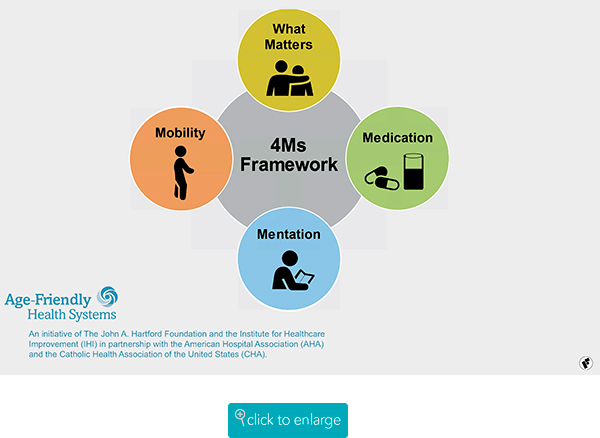
Commit to Getting the Care You Need as You Age
Older adults in America are living longer lives and will outnumber people under the age of 18 by nearly 500,000 by 2034, according to the U.S. Census Bureau.
However, living longer does not automatically mean living healthier or happier. In fact, nearly 61% of people in America aged 65 and older live with chronic conditions, according to the National Institutes of Health, and a report from the National Academies of Sciences, Engineering and Medicine found nearly 1 in 4 older adults are considered to be socially isolated.

Research published in “Health Affairs” indicates that people who advocate for their own care feel more empowered. The age-friendly health systems approach can help older adults take control of their well-being and demand care that helps them maintain independence by making sure their doctors know their needs and preferences; also called “what matters.”
Just as the name implies, age-friendly care prioritizes what matters most to each individual older adult and helps meet goals such as daily walks around the neighborhood or cooking favorite meals. To get started, consider these four essential elements of age-friendly care from The John A. Hartford Foundation to discuss with your doctor:
What Matters. As people age, what matters most to them might change. It is important to share concerns, goals, wishes, needs and experiences with your health care providers. What matters also includes end-of-life care goals and preferences.
Medication. Many older adults take multiple medications, which can cause side effects and, in turn, impact daily living. Honest conversations with doctors about medications, their interactions and side effects can ensure treatment plans are optimizing quality of life.
Mentation. Older adults are at higher risk for dementia, depression and delirium, and conversations with medical providers about changes in memory or mood and annual screenings for dementia and depression can lower the risk.
Mobility. Staying active can help older adults maintain health and independence. Talking to health care providers about mobility concerns can identify personalized tips to improve strength, flexibility and balance.
Healthy aging is possible when the patient and care team are on the same page with the same plan in mind. For ideas on how to start these conversations, visit johnahartford.org/agefriendly.

Photo courtesy of Getty Images (Doctor at home)
Source:
The John A. Hartford Foundation

